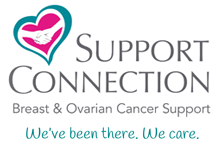(Published by: Lohud.com)
Ovarian-cancer survivor Ilene Cohen talks about volunteering at Support Connection, where services are free:
Ilene Cohen went for an annual checkup with her longtime gynecologist in June 1994. “I really didn’t notice anything except I was developing a little pot belly, and I thought, ‘Well, I’m 49 years old, maybe my weight is redistributing,’ ” says Cohen, a mother of two. “I don’t think I was gaining any weight, but my pants were getting tighter.” In the weeks prior to her appointment, she was also urinating more frequently but had no pain or discomfort. Cohen’s doctor, however, took one look at her belly — in actuality, the size of a four-and-a-half month pregnancy, she says — and told her something was wrong. After an ultrasound confirmed a pelvic growth, she underwent a complete hysterectomy, including the removal of her ovaries, on July 1. “I didn’t even know it was cancer until the Fourth of July,” says Cohen, who still remembers how her doctor gave her the diagnosis. “He said, ‘I have bad news and good news.’ The bad news is that it was ovarian cancer. The good news is that it was Stage 1A.”
How she fought it: Ten days after her surgery, Cohen started the first of six rounds of chemotherapy. Her hair thinned, she says, and she bought a wig but never used it. For the first five years after her diagnosis, she had twice-yearly pelvic CAT scans, blood tests for CA-125 (the tumor marker for ovarian cancer) and exams with her gynecologist. The frequency of the tests diminished in subsequent years, as results continued to come back negative. These days, Cohen sees her doctor once a year.
Getting support: Cohen didn’t know anyone who’d had ovarian cancer, and Support Connection — the Yorktown Heights-based nonprofit that helps women with breast and ovarian cancer — was not yet in existence. “I went to the library and just tried to read up on it, but my oncologist was this very fatherly type who said, ‘Everything’s going to be OK. Don’t read anything about it. It’s just going to make you worried,’ ” says Cohen, whose oncologist also urged her to not to look at survival statistics because that information would frighten her.
Giving back: Two years after her cancer diagnosis, Cohen happened to get a postcard in the mail announcing the opening of Support Connection’s Yorktown Heights offices and its upcoming fundraising walk. When she learned the organization offered free services to women with breast and ovarian cancer, Cohen immediately offered to help out. Since 1996, she’s volunteered in the organization’s offices two or three days a week, and continues to play an active role at its Support-a-Walk, an annual fundraising walkathon in FDR Park.
Advice: For a woman who’s newly diagnosed with ovarian cancer, an organization like Support Connection is invaluable, says Cohen. “Get as much information as you can,” she says. “I think it helps to calm you down, because you’re just so scared and bewildered. Support Connection is a wonderful organization.”

